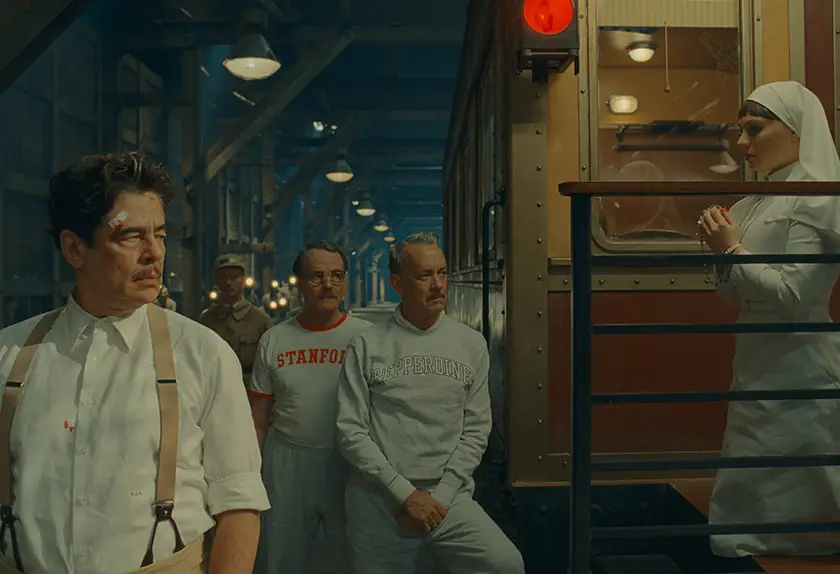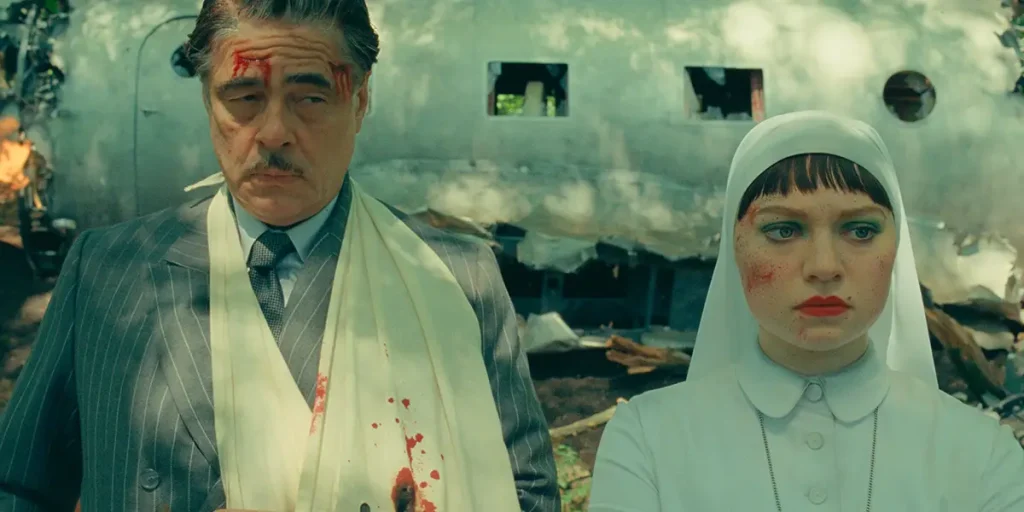Wes Anderson’s The Phoenician Scheme swaps quirk for authenticity, offering a father-daughter tale that balances style and substance.
Writer and Director: Wes Anderson
Genre: Action, Comedy, Crime, Drama, Spy, Thriller
Run Time: 105′
Cannes Premiere: May 18, 2025 (In Competition)
U.S. Release Date: May 30, 2025 (limited) / June 6, 2025 (wide)
U.K. Release Date: May 23, 2025
Where to watch: Digital & VOD
Wes Anderson’s The Phoenician Scheme is what happens when a filmmaker known for pastel melancholic dreamscapes and symmetrical storybook whimsy decides to scale back the quirks and focus on the story beneath it all. After the divisive Asteroid City, which was hyper-stylized to the point of being alienating, and the labyrinthine headiness of The French Dispatch, Anderson has recalibrated, delivering a film that feels almost streamlined by his standards.
It’s a zippy, sardonic, and surprisingly sensitive adventure, resulting in a movie that’s less like a diorama and more like a living, ticking machine: messy and ornate but with real emotional voltage. It’s his most accessible live-action feature in a decade.
The film opens with a bang—literally. In what might be the funniest cold open Anderson’s ever crafted, Zsa-Zsa Korda (Benicio del Toro, No Sudden Move) survives his sixth plane crash, so outrageous and precisely orchestrated it’s hard not to grin. A bisected passenger, a pilot fired mid-ejection, and a casual parachute escape are all part of the controlled chaos held together by del Toro’s bone-dry delivery. Someone clearly wants Korda dead, and rather than panic, this obscenely wealthy magnate makes a business decision: it’s time to name an heir to his empire. Despite having nine sons (many adopted in hopes of finding the next genius), he selects his only daughter, Sister Liesl (Mia Threapleton, The Buccaneers), a nun whose pure moral compass might cleanse the family’s questionable legacy.
What follows is a globe-spanning odyssey full of power brokers, family politics, and existential business meetings as father and reluctant daughter attempt to secure funding for a new, supposedly ethical venture. Threapleton, making the most of her Anderson debut, walks a tightrope between innocence and an iron resolve, channeling the clarity of a young Kate Winslet (unsurprisingly, she’s her daughter), while bringing her own brand of sharp-eyed energy to the role. As both heir and conscience to Korda’s sprawling empire, Liesl’s habit and hesitant principled certainty create tremendous tension against her father’s pragmatic ruthlessness.

The succession drama is just scaffolding for a parade of delightfully odd encounters and cameos. Riz Ahmed (Sound of Metal) shows up early as Prince Farouk, a soft-spoken royal with economic clout; Tom Hanks (Elvis) and Bryan Cranston (The Studio) are wealthy bickering brothers who negotiate through high-stakes basketball; Benedict Cumberbatch (The Power of the Dog) is wildcard Uncle Nubar, who resembles a rejuvenated Rasputin. By the time Bill Murray (Riff Raff) appears as God, a cosmic promotion from his usual Anderson roles, it’s clear that the plot serves partly as an excuse for these characters to ping-pong off each other in the gorgeously adorned rooms from production designer Adam Stockhausen and set decorator Anna Pinnock.
There’s not enough room to mention the contributions of Mathieu Amalric, Richard Ayoade, Jeffrey Wright, Scarlett Johansson, Rupert Friend, Hope Davis, and Willem Dafoe. Still, I will mention that Michael Cera (The Adults) nearly walks off with the movie as Björn Lund, a Swedish tutor and insect expert whose logic is baffling but persuasive. It’s the kind of character only Anderson and frequent collaborator Roman Coppola could dream up, and only Cera could make this hilarious and weirdly poignant all at once. The film brightens by a few watts every time he’s on screen.
Visually, The Phoenician Scheme is classic Anderson, but with a twist. This marks the director’s first collaboration with cinematographer Bruno Delbonnel (Amélie), and you can feel the difference. Delbonnel maintains the director’s visual style while adding subtle new textures and shades of burnished golds and dusty reds. It’s a visual mood distinct from Anderson’s Robert Yeoman-shot classics, and while the usual dollhouse compositions are still present, they are allowed more space than usual. Milena Canonero’s costumes telegraph character with minimal dialogue needed, and Alexandre Desplat’s (The Shape of Water) score, always an MVP, winds its way through the film with his familiar melodic mischief.
The first half has a lot to love: the pacing is tight, the rapid-fire dialogue has frequent zingers, and the editing keeps it all humming along. But as the plot thickens, the energy wanes and the middle section loses momentum as the scheme grows increasingly convoluted. Korda’s hazy plan involving ethical capitalism and resource extraction matters less than the evolving relationship between father and daughter, but it creates a distinct lull that tests patience. There’s a sense that Anderson and Coppola are knowingly riffing on paranoid corporate thrillers but without the narrative momentum those usually demand.
Then, blessedly, the final act roars back with purpose and sheds the tangle of subplots, finding clarity in the only relationship that truly matters: father and daughter. For all his pretense, Korda wants to pass on something more than money. For all her reluctance, Liesl wants to do more than reject it. It’s then that you realize, as the grenades and betrayals give way to personal reflection, that the film’s heart isn’t in the scheme at all. It’s in watching a daughter learn the mighty difference between inheriting power and earning it. In these scenes, del Toro brings an unexpected twinkle-eyed warmth beneath his straight-faced exterior, delivering his most spirited performance in years. Anderson has always excelled at unlocking playful dimensions in serious actors, and here he coaxes a performance from del Toro that balances sly menace with tentative vulnerability.
This is Anderson’s most inviting film in over a decade. It’s not because he’s changed who he is as a filmmaker. After all, he’s still filling frames with obsessive care and crowding them with award-winning actors who show up for five minutes and vanish. It’s because he’s let a little air in and made space for the mess that humanity brings. Like another emotionally serious Anderson effort, Moonrise Kingdom, The Phoenician Scheme is about searching for an authentic connection in artificial circumstances. Similar to Korda walking away from another flaming crash, Anderson appears to be emerging from his recent cinematic turbulence with a clear-eyed sense of where to go next.
If The French Dispatch felt like a museum exhibit and Asteroid City was an abstract painting, then The Phoenician Scheme is a pop-up book with teeth. Smart, stylish, and sneakily emotional, it may not convert Anderson skeptics, but it’s the perfect summer reset for the world’s most obsessive world-builder and a warm welcome back for anyone who thought they’d drifted too far from his orbit.
The Phoenician Scheme: Movie Plot & Recap
Synopsis:
When eccentric billionaire Zsa-zsa Korda survives his sixth assassination attempt, he chooses his estranged daughter, a nun named Sister Liesl, as his unlikely successor, launching them on a globe-trotting adventure to secure his business legacy.
Pros:
- Del Toro and Threapleton deliver standout performances
- Anderson’s visual style evolves while remaining distinctly his
- More emotionally accessible than the director’s recent work
- Michael Cera steals every scene as Björn Lund
Cons:
- Middle section drags with convoluted business dealings
- The actual “scheme” plot becomes needlessly complex
- Some viewers might still find Anderson’s style too precious
The Phoenician Scheme premiered at the Cannes Film Festival on May 18, 2025, in competition, and opened in US theatres on June 6 and in UK & Irish cinemas on May 23. The film will be released on digital platforms on July 8, 2025 and on 4K UHD and Blu-Ray on July 29.

